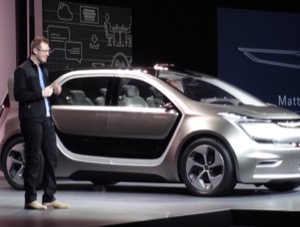
Love child of a minivan and a Gremlin.
If the Fiat-Chrysler media presentation is anything to judge by, the major automaker offensive at CES will be long on flashy concepts, disappointingly short on actual products but interesting from a business innovation perspective. The event featured a mock up a concept car that’s “designed by millennials for millennials”, along with the four millennials who are apparently responsible for it. They did some decidedly old school gushing over the car – called the Chrysler Portal – before wrapping up with a group hug.
Three things stand out about the Portal concept: it depends heavily on mobile data connections, it unlinks ownership from use and it’s intended to be a work in progress.
Buzz words included “galaxy of cloud based content” and “next generation vehicle that serves as a hub for your life”. What that means is that the car will be networked to remote servers that will keep track of who you are, where you are, what you like and how you drive (or how you sit back and be a passenger), and adjust settings accordingly. Preferences – music tastes, seat adjustments, smart phone interfaces and the list goes on – will be automatically set on a seat by seat, person by person basis.
The same will be true of control panel features, self driving functions and even appearance. The design incorporates exterior accent lighting that changes color depending on occupants tastes and moods, and on who is driving. Or what is driving. The, um, concept is to set a standard color for autonomous mode – when the software is eventually updated to that level – so everyone knows when a computer has the wheel.
The implication is that you don’t have to own a car to drive it or benefit from its features. Identity recognition is integral to the design. No keys or fobs required. If the system – car plus remote platform – recognises you and decides you have sufficient privileges, you can drive away. Traditional car ownership isn’t going away any time soon, but the capabilities point to an alternative business model where car transportation is sold as service, rather than a product.
